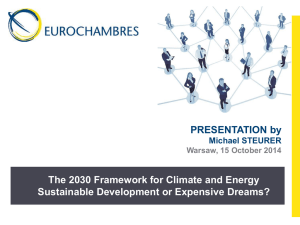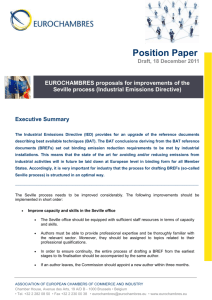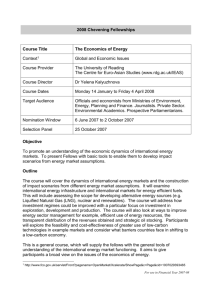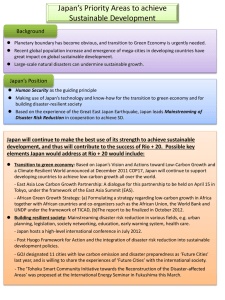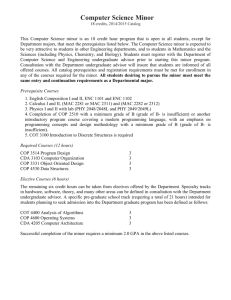EUROCHAMBRES PowerPoint presentation
advertisement
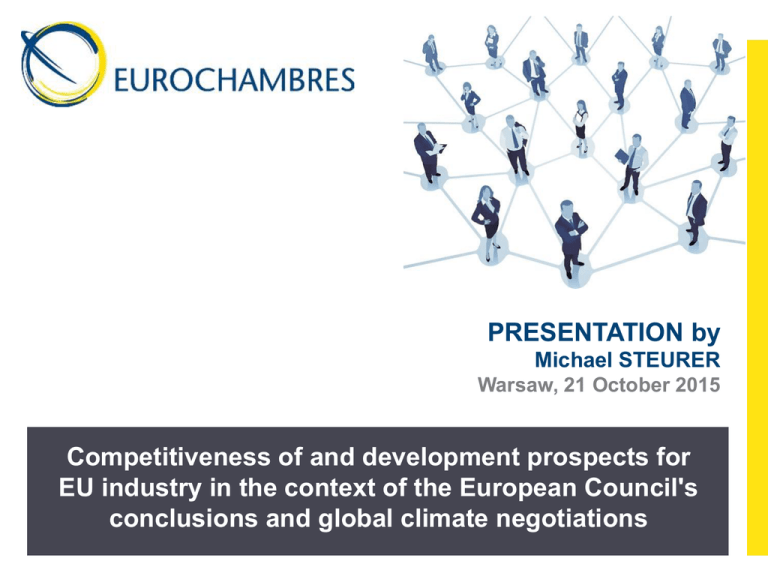
PRESENTATION by Michael STEURER Warsaw, 21 October 2015 Competitiveness of and development prospects for EU industry in the context of the European Council's conclusions and global climate negotiations EUROCHAMBRES Association of European Chambers of Commerce and Industry 45 members associations 1,700 regional and local Chambers 20,000 businesses (93% SMEs) 120,000,000 employees Towards a global agreement CO2 emissions* in the top 5 emitting countries Source: Source: EDGAR 4.2FT2010 (JRC/PBL 2012); BP 2014; NBS 2014; USGS 2014; WSA 2014; NOAA 2012 * from fossil fuel use and cement production Kyoto 1997 Doha 2012 Paris 2015 Trends in Carbon Pricing Source: World Bank 2014 The future EU-ETS Market Stability Reserve Higher Costs Source: European Commission ETS-Reform Shortened Carbon Leakage list Electricity Prices Source: European Commission Development of Industrial Production Source: Eurostat Expectations for COP 21 • No single country or even continent can combat global warming alone. Anything less than a global solution that includes all major emitters will not work. • Each party needs to adopt and implement clear national emission targets that are subject to a fair burden-sharing at global level. • Investment decisions should be stimulated by interlinked carbon pricing systems in all major emitting countries, while the planned Green Climate Fund will act as effective catalyst for low-carbon investments in developing countries. • The transition to a low-carbon economy requires massive investments in Research and Development in order to provide those technologies that can make change materialise. Success factors for COP 21 Survey among the Members of the Global Chamber Platform (September/October 2015): Recommendations for EU action In the frame of a successful agreement, the EU and its Member States • should adapt their energy policy without delay to lead by example. This includes a more cost-effective uptake of renewable energy and the immediate provision of adequate infrastructure. At the same time, the EU needs to recognise the importance of fossil fuels for security of energy supply. • avoid measures that undermine the credibility of the EU Emissions Trading Scheme (ETS). Only a well-functioning and pro-competitive ETS will exert a pull to non-EU countries and expand to a global carbon market. Sectors at risk of carbon leakage need to be protected beyond 2020. Recommendations for EU action • need to scale up the mobilisation of climate finance in the context of meaningful mitigation and adaptation efforts. In order to attract more private investors, the EU must support poor countries in strengthening their regulatory frameworks and increasing business confidence. • must turn the currently vague concept of the Energy Union into clear and precise actions promoting competitiveness and the re-industrialisation of Europe. CONTACT DETAILS Thank you for your attention ! Michael STEURER Advisor, EU Affairs Energy, Climate Change, Environment Avenue des Arts 19 A-D B - 1000 Brussels Tel: +32 (0)2 282 08 77 Fax: +32 (0)2 230 00 38 steurer@eurochambres.eu www.eurochambres.eu
